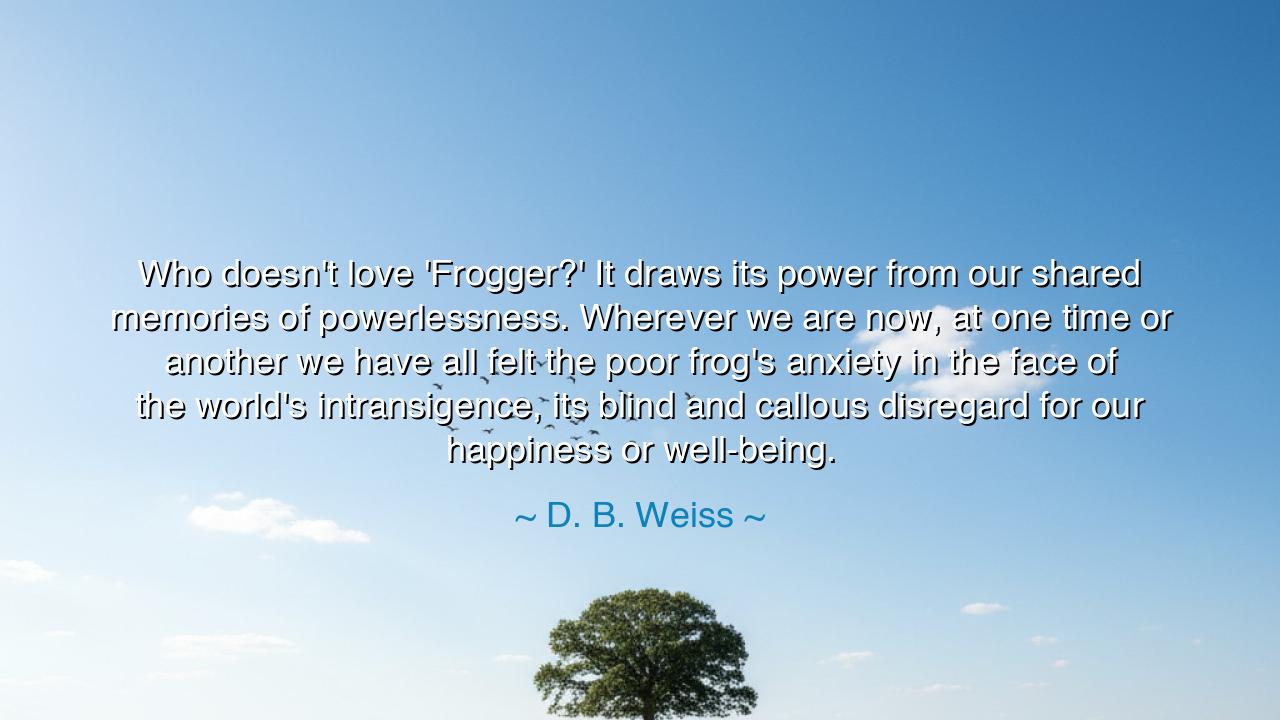
Who doesn't love 'Frogger?' It draws its power from our shared
Who doesn't love 'Frogger?' It draws its power from our shared memories of powerlessness. Wherever we are now, at one time or another we have all felt the poor frog's anxiety in the face of the world's intransigence, its blind and callous disregard for our happiness or well-being.






“Who doesn't love 'Frogger?' It draws its power from our shared memories of powerlessness. Wherever we are now, at one time or another we have all felt the poor frog's anxiety in the face of the world's intransigence, its blind and callous disregard for our happiness or well-being.” — Thus spoke D. B. Weiss, not merely of a game, but of the human condition itself. Beneath the surface of this simple amusement — a frog crossing a road — lies a mirror of the eternal struggle of mankind. For who among us has not felt like that fragile creature, striving to reach the other side while fate hurls obstacles in endless succession? In the frog’s peril, we see our own trembling journey across the world’s indifference.
The ancients knew this truth well, though their “roads” were not paved with cars but with chaos, war, and the unpredictable will of the gods. They taught that life is a crossing — narrow, dangerous, and often unkind. The world does not move to our rhythm, nor bend to our needs. Like the frog, we leap from moment to moment, uncertain which stone will hold and which will sink. The currents of chance flow around us, and in that ceaseless motion, we learn humility. Powerlessness is not our enemy, but our teacher; it reminds us that strength begins where control ends.
When Weiss speaks of the “world’s callous disregard,” he touches the core of ancient wisdom — that the universe is vast and unmoved by our desires. The sun rises on the just and the unjust alike; the rain falls without mercy or favoritism. Yet within that indifference lies the challenge that defines us. To live is to cross the traffic of existence, one cautious step at a time, carrying our hope like a fragile flame through the storm. Each leap is an act of faith, a declaration that though the world may not care for our happiness, we shall pursue it nonetheless.
Consider the story of Sisyphus, condemned by the gods to roll his boulder up the hill for eternity. His task was endless, his effort forever undone. And yet, as the philosopher Camus once said, “One must imagine Sisyphus happy.” For though the gods denied him victory, they could not take from him the dignity of struggle. Like the frog in Weiss’s words, Sisyphus represents us all — weary, defiant, and endlessly striving against the indifference of the world. Our anxiety is real, but it is also proof that we are alive, that we still yearn, still believe, still fight to reach the far shore.
There is beauty in this struggle. The frog’s journey, humble though it may seem, is a symbol of courage. Each crossing teaches us patience, resilience, and awareness. We learn to watch, to wait, to move wisely — not because the world will yield, but because we refuse to surrender. The game, like life, is not about conquering the chaos, but about moving through it with grace. Each failed leap is a lesson; each success, a whisper of triumph in a world that owes us nothing.
And yet, even in this struggle, we are not alone. The shared memory of powerlessness binds us together as kin. Every soul has known fear, every heart has felt small beneath the weight of fate. When we see the frog’s peril, we remember our own — and in that remembrance, compassion awakens. To understand the fragility of another is to soften the hardness of our own hearts. Thus, in the reflection of that tiny creature’s plight, we rediscover our shared humanity.
The lesson is clear: do not curse the world’s indifference, but meet it with courage. Do not demand that life be easy; learn instead to leap wisely and with faith. When hardship comes — and it will — remember the frog, who keeps moving not because the path is kind, but because he must. We too must keep moving, not in despair, but in quiet defiance.
So, my child, when you feel small before the vastness of life, when fate seems cruel and fortune blind, recall this: the world may be intransigent, but your spirit need not be. The road is long, the river swift, the traffic unyielding — yet even the smallest creature may cross it by courage alone. Leap boldly, even knowing the danger. For in each leap, you affirm your existence, and in each crossing, you reclaim a little more of your happiness from the heartless flow of the world.






AAdministratorAdministrator
Welcome, honored guests. Please leave a comment, we will respond soon